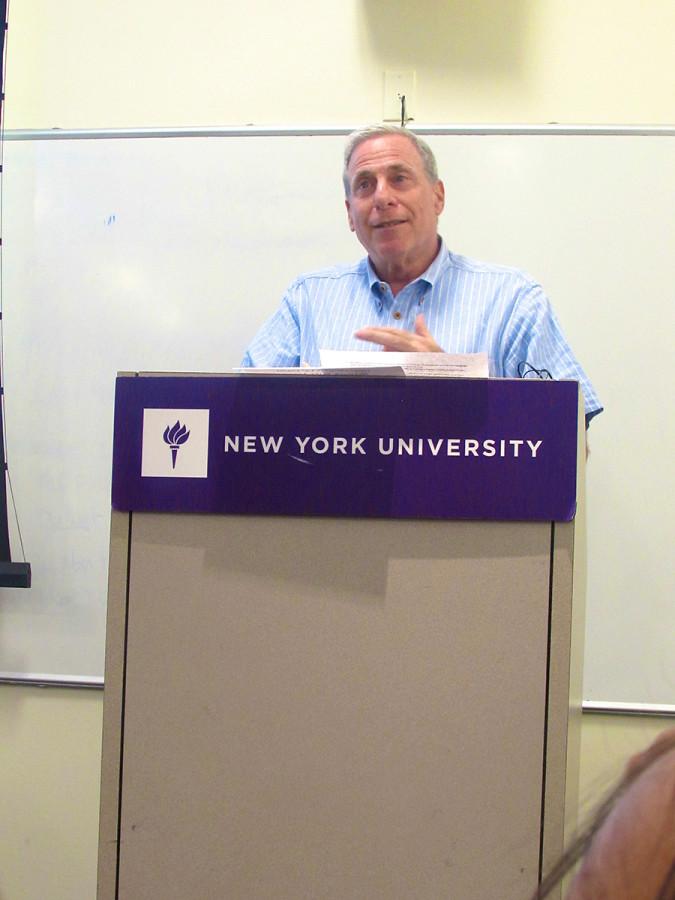When New York University’s campus paper, the Washington Square News, published an article on a “discussion” that was clearly one-sided on the Iran nuclear dear, CAMERA Fellow Raizy Cohen, immediately rushed to publish a counter-argument to ensure her students were receiving both sides to this discussion as originally promised. Not only did the WSN not publish Cohen’s piece, but they didn’t even respond to her correspondence, clearly not interesting in showing an unbiased perspective in their paper on the Iran nuclear deal with the NYU students.
Below is Raizy Cohen’s article for those who do want to read another perspective.

There are seven countries in the world that deem homosexuality a crime that is punishable by death. One out of those seven countries is also the largest state sponsor of terrorism the world over. That country is the Islamic Republic of Iran. It is for these reasons and several others, that I was deeply disappointed by the article “Politics Society discusses Iran nuclear deal” which ran recently in Washington Square News. If this event with Professor de Mesquita was in fact a discussion, the article certainly did not make it out to be one. The aforementioned article insinuated that the Iran deal was in America’s best interest and even went so far as to call “a remarkable diplomatic achievement.”

In a live interview with CNN, Secretary of State John Kerry stated “No deal is better than a bad deal, because a bad deal could actually make things less secure.” He repeated this sentiment on CSpan, and FoxNews, and ABC News, and 60 Minutes, to name a few. This was echoed by President Obama, Hillary Clinton, and many other members of the Obama administration up until several months ago, when this “deal” was brokered against the will of congress and, ultimately, the American people. Contrary to these beliefs in the article, the events director was quoted, saying that “compromise was necessary to find stable ground between the U.S. and Iran.” It has been one of America’s greatest convictions that she was not to negotiate with terrorists, but it would seem that this conviction has fallen to the way-side even as the streets of Iran teem with the smoke of American flags aflame.
The article calls this negotiation “what can be done to reconcile between the two countries’ positions,” despite the fact that “it might not be what everyone wants,” but what is it exactly that Iran is compromising? From America’s perspective, there certainly is no lack of concessions. The Obama administration has offered Iran one hundred and fifty billion dollars and the lifting of preventative arms embargoes, and has not even dared demand back the four American hostages currently being held captive in Iran, among them a journalist, a pastor, an ex-Marine, and an ex-FBI agent. These four prisoners and their life’s work of choice embody what distinguish America from her new “partners in peace”- the right to free speech and free religion, and the protection of democracy and the free world. While Obama says that he is “deeply concerned” about these four America citizens detained on Iranian soil, I would venture to say that “pushing hard” doesn’t quite cut it.
Perhaps the most alarming part of this piece is when Professor de Mesquita is quoted saying that, despite the fact that the US has basically waived its rights to inspect Iranian nuclear facilities, “it will be very hard for Iran to cheat” given the seismic impact of nuclear testing. If the over-simplifying turn of phrase was not disturbing enough, perhaps the statement was disturbing because it is a product of blatant bias bordering on falsehood. In the current Iran deal, after eight years the only thing stopping Iran from working on ballistic missiles is a non-binding recommendation. If, before eight years, Iran is deemed to be enriching for peaceful purposes, all restrictions will be lifted. (AIPCA Memo, 9/24/2015). That’s ignoring the fact that, after fifteen years, Iran is completely free to acquire nuclear weapons. That means that the world is not and will not be protected from Iran, be it with short range missiles or ICBMs.
What the professor, apparently, glossed over, was Iran’s propensity toward human rights violations. I suppose, however, that if the US citizens are to turn a blind eye to the shouting of “Death to America” in the streets of Tehran, surely they can ignore the fact that, in Iran, women’s lives are literally worth half of their male counterparts. In essence, America has issued a carte blanche to one of the most dangerous countries in the most volatile region in the world. I am wondering what about this, exactly, is a “remarkable diplomatic achievement?” To paraphrase Voltaire, this seems to be neither remarkable, nor diplomatic, nor an achievement.
This was contributed by NYU PolyTechnic CAMERA Fellow Raizy Cohen.

